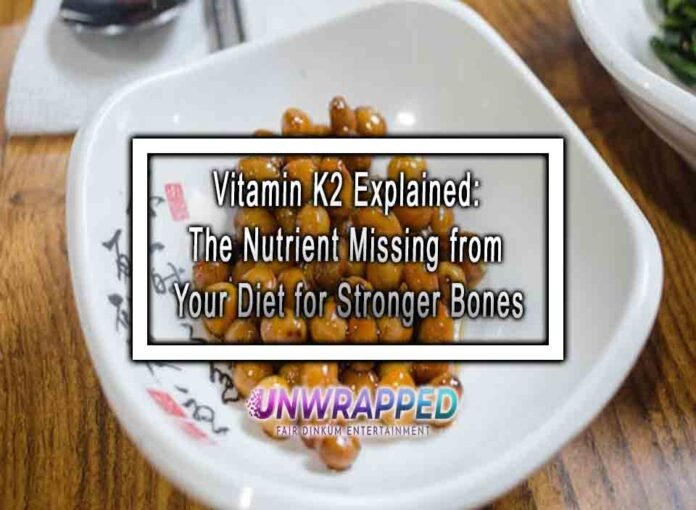Vitamin K2 is gaining recognition as a crucial nutrient for bone health, yet it remains underappreciated in many diets. While calcium and Vitamin D often take center stage, Vitamin K2 plays a pivotal role in directing calcium to the right places—your bones and teeth—while keeping it away from areas where it could cause harm, such as arteries.
This article explores the science behind Vitamin K2, its impact on calcium absorption, top food sources, supplementation tips, and how it supports overall bone health.
What Is Vitamin K2?
Vitamin K2 is a fat-soluble vitamin that belongs to the Vitamin K family. Unlike Vitamin K1, which primarily supports blood clotting, K2 is vital for bone and cardiovascular health.
Types of Vitamin K2:
Vitamin K2 exists in several forms, with the most common being:
- MK-4: Found in animal-based foods and supplements.
- MK-7: Derived from fermented foods and known for its longer half-life, making it more effective in the body over time.
Why It Matters: Vitamin K2 activates two essential proteins:
- Osteocalcin: Ensures calcium binds to bone.
- Matrix Gla-Protein (MGP): Prevents calcium from depositing in soft tissues like arteries.
How Vitamin K2 Supports Calcium Absorption
Calcium is crucial for strong bones, but without proper guidance, it can end up in the wrong places. That’s where Vitamin K2 comes in.
1. Directing Calcium to Bones
Vitamin K2 activates osteocalcin, a protein that binds calcium to the bone matrix. This process strengthens bones and improves their density.
2. Preventing Arterial Calcification
K2 ensures that calcium doesn’t accumulate in arteries, reducing the risk of cardiovascular diseases. Studies have shown that individuals with adequate Vitamin K2 intake have a lower risk of arterial calcification.
3. Enhancing the Effectiveness of Vitamin D
Vitamin K2 works synergistically with Vitamin D. While Vitamin D increases calcium absorption from food, K2 ensures that absorbed calcium is directed to the right places.
Foods Rich in Vitamin K2
Incorporating Vitamin K2-rich foods into your diet is an effective way to support bone health.
Top Sources of Vitamin K2:
- Natto (fermented soybeans): The richest source of MK-7.
- Egg Yolks: Provide small amounts of K2, particularly when sourced from pasture-raised chickens.
- Cheese: Certain hard cheeses like Gouda and Brie are excellent sources of K2.
- Liver: Especially from grass-fed animals, rich in MK-4.
- Fermented Foods: Foods like sauerkraut and kimchi may also provide K2 in smaller amounts.
Pro Tip: Pair Vitamin K2-rich foods with healthy fats for better absorption since K2 is fat-soluble.
Supplementation Tips for Vitamin K2
If dietary intake isn’t sufficient, supplements can help fill the gap.
Choosing the Right Supplement
- MK-4 vs. MK-7: MK-7 is more bioavailable and has a longer half-life, making it ideal for daily supplementation.
- Dosage: Most studies recommend 100–200 mcg per day for optimal bone and cardiovascular health.
- Synergy with Vitamin D: Look for combined Vitamin D3 and K2 supplements for maximum benefits.
When to Take Vitamin K2
Take your supplement with a meal containing healthy fats to enhance absorption.
How Vitamin K2 Enhances Bone Strength
Vitamin K2 addresses critical gaps in bone health by:
- Increasing Bone Mineral Density (BMD): Studies show that K2 supplementation improves BMD, especially in postmenopausal women.
- Reducing Fracture Risk: By improving bone strength and structure, K2 helps lower the likelihood of fractures.
- Supporting Overall Bone Quality: Beyond density, K2 contributes to the flexibility and resilience of bones, reducing the risk of breaks under stress.
The Link Between Vitamin K2 and Cardiovascular Health
Beyond its role in bone health, Vitamin K2 is vital for heart health.
1. Preventing Calcification
Matrix Gla-Protein (MGP), activated by K2, prevents calcium from hardening in arterial walls.
2. Supporting Vascular Health
Regular intake of K2 has been associated with improved arterial elasticity and reduced cardiovascular risks.
Quick Tips for Stronger Bones with Vitamin K2
1. Combine Nutrients Wisely
Pair Vitamin K2 with:
- Vitamin D3: Enhances calcium absorption.
- Magnesium: Helps convert Vitamin D into its active form.
2. Focus on Weight-Bearing Exercises
Activities like walking, jogging, or resistance training stimulate bone remodeling and growth.
3. Optimize Gut Health
A healthy gut microbiome aids in the production of Vitamin K2, especially from fermented foods.
Common Myths About Vitamin K2
Myth 1: Vitamin K1 and K2 Are the Same
Truth: While both are part of the Vitamin K family, K1 primarily supports blood clotting, and K2 is essential for calcium regulation.
Myth 2: Calcium Alone Is Enough for Strong Bones
Truth: Without Vitamin K2, excess calcium can lead to calcification in arteries, not stronger bones.
Myth 3: You Can Get Enough K2 Without Trying
Truth: K2 is found in limited foods, and many diets are deficient in this nutrient.
Conclusion: Don’t Overlook Vitamin K2 for Bone Health
Vitamin K2 is the missing link in many bone health regimens. By ensuring calcium is directed to bones and teeth while preventing arterial calcification, K2 plays a dual role in supporting skeletal and cardiovascular health.
To reap the full benefits, prioritize K2-rich foods like natto, cheese, and egg yolks, or consider a high-quality supplement paired with Vitamin D3. Combined with weight-bearing exercises and a healthy lifestyle, Vitamin K2 is your ally for stronger bones and better overall health.
References
- Geleijnse, J. M., et al. (2004). “Dietary intake of menaquinone is associated with a reduced risk of coronary heart disease.” Journal of Nutrition.
- Rangel, L. B. A., & Silva, C. D. (2019). “Vitamin K2 and bone health: A systematic review.” Nutrition Research Reviews.
- Schurgers, L. J., et al. (2007). “Vitamin K2, a powerful cardiovascular protector.” Clinical Journal of Nutrition.
- Fujita, Y., et al. (2012). “The role of Vitamin K2 in bone metabolism and osteoporosis.” International Journal of Molecular Sciences.
- Sato, T., et al. (1999). “Effect of Vitamin K2 on bone mineral density in elderly women.” Journal of Bone and Mineral Research.
See Also: Circadian Rhythms and Digestive Health: Unlocking the Science of Sleep and Nutrition










